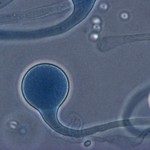Link to Pubmed [PMID] – 23788479
J. Antimicrob. Chemother. 2013 Nov;68(11):2435-44
Current, widely accepted guidelines for the management of HIV-associated cryptococcal meningoencephalitis (CM) recommend amphotericin B combined with flucytosine (5-FC) for ≥2 weeks as the initial induction treatment of choice. However, access to flucytosine in Africa and Asia, where disease burden is greatest, is inadequate at present. While research into identifying effective and well-tolerated antifungal combinations that do not contain flucytosine continues, an ever-increasing body of evidence from in vitro, in vivo and clinical studies points to the benefits of flucytosine in the treatment of CM in both intravenous combinations with amphotericin B and oral combinations with high-dose fluconazole. This article provides an up-to-date review of this evidence, and the current issues and challenges regarding increasing access to this key component of combination antifungal therapy for cryptococcosis.



